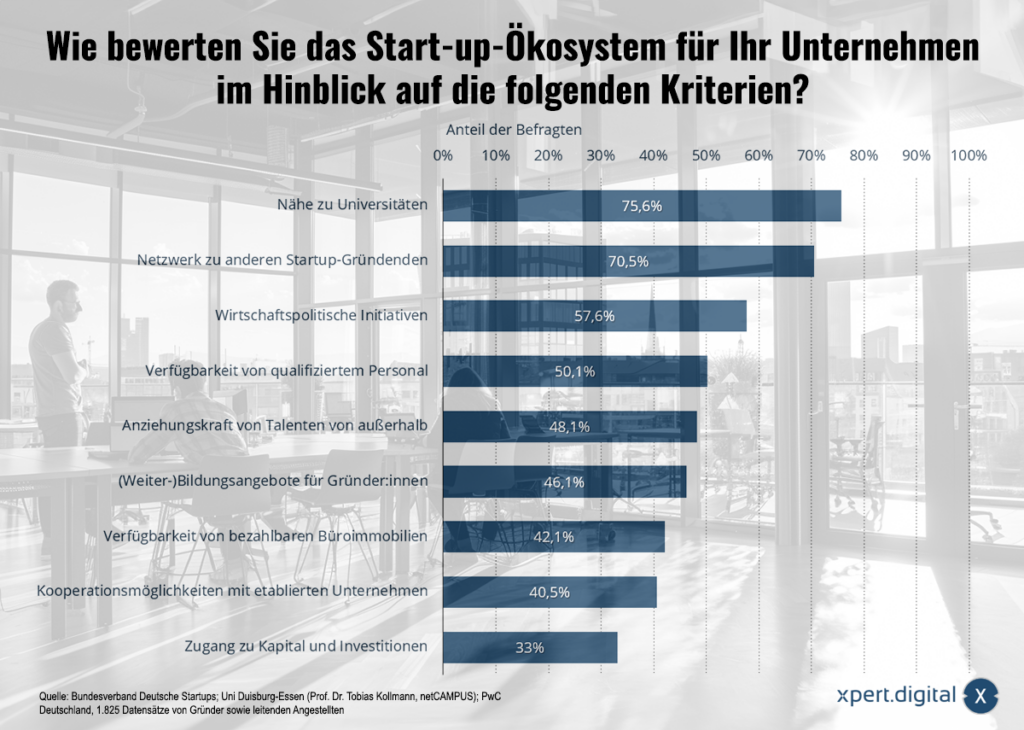Published on: October 24, 2024 / Update from: October 24, 2024 - Author: Konrad Wolfenstein

The transformation of startups into an economic factor and pillar of the German infrastructure - today people start up differently - Image: Xpert.Digital
The transformation of the startup landscape: changing challenges and opportunities
In recent years, the landscape of German startups has changed fundamentally. New start-ups and financing were once at an all-time high: within a year, over 3,200 startups were launched, and investments of more than 17 billion euros flowed into young companies. These figures marked record levels that reflected the optimism and dynamism of the industry.
But since then the economic environment has deteriorated. The change in interest rates has not only tightened financing conditions, but has also led to bottlenecks in the area of venture capital. At the same time, customers are becoming more reserved, which has a direct impact on the sales of many startups. The areas of FinTech and e-commerce, which have long been considered the driving forces of the ecosystem, are particularly hard hit. Their dominance is now being challenged by new industries.
Despite these challenges, numerous new opportunities are also opening up. The boom in generative artificial intelligence continues to drive the SaaS sector forward. DeepTech companies that translate scientific findings into practical applications are becoming increasingly important in the context of global transformations. They address complex problems in areas such as climate change, health and industrial automation, thereby contributing to Germany's competitiveness.
A new founding paradigm
Nowadays it is founded and invested differently than a few years ago. While the credo “growth at all costs” used to be used, profitability is now coming to the fore. Founders develop strategies at an early stage that, in addition to ambitious growth goals, also show a clear path for profitability. This rethinking is a reaction to the changed market conditions and the increased requirements of investors.
B2B startups are becoming increasingly important in this context. While B2C companies have long been in the spotlight and attracted large funding rounds, business models that target corporate customers are now coming into focus. Examples of this include Celonis and Personio, two of the three most valuable German startups, both of which operate in the B2B SaaS sector. They show that sustainable growth and scalability in the business customer sector hold great potential.
Suitable for:
Efficiency and resource conservation as drivers
The overarching framework of this development is the pursuit of increasing efficiency and conserving resources. At a time when economic and ecological challenges are increasing, it is more important than ever to offer clear economic added value. Startups that optimize processes and use resources intelligently make a decisive contribution to the competitiveness of companies and the sustainability of the economy.
Demographic change and the associated shortage of skilled workers are reinforcing this trend. The optimal deployment of employees is becoming a central issue. Startups develop innovative solutions to automate work processes, promote further training and increase employee satisfaction. This is not only relevant from a business perspective, but also for the attractiveness of Germany as an employer market.
Suitable for:
The German Startup Monitor as a mirror of change
The German Startup Monitor documents this change process and analyzes the defining factors of the ecosystem. It shows which trends are emerging and which challenges need to be overcome. It is clear that startups are playing a key role in the economy more than ever.
The basis of the analysis is a clear definition of startups in contrast to general business start-ups. While the latter includes any form of professional self-employment, a startup is characterized by an innovative and/or scalable business idea. Innovativeness means developing new products, services or business models that do not yet exist in this form. Scalability refers to the fact that the business model can grow significantly with relatively little additional effort.
These two core criteria only apply to a small proportion of start-ups, but they allow for a clear distinction. Startups are usually very growth-oriented and employ more people on average than traditional start-ups. Their financing structure is often characterized by external investors who recognize and promote the high growth potential.
The economic importance of startups
The special characteristics of startups underline their importance for the national economy. They are engines for innovation, create new jobs and contribute to the competitiveness of the business location. Through their agility and willingness to take risks, they open up new markets and drive technological advances.
In times of global challenges, be it digital change, climate change or geopolitical tensions, startups are essential for the development of sustainable solutions. They work on renewable energies, innovative mobility concepts and digital platforms that can improve people's lives.
Challenges and opportunities
Despite their potential, startups face numerous challenges. Financing remains a critical factor, particularly during periods of economic uncertainty. Regulatory hurdles, access to skilled workers and competition on a global level are other aspects that need to be overcome.
But the chances outweigh the odds. Increasing digitalization is opening up new business areas and the need for innovative solutions is constantly growing. Cooperations between established companies and startups can create synergies and promote knowledge transfer.
Change in the German startup landscape
The change in the German startup landscape shows that flexibility and adaptability are crucial. The shift from pure growth strategies to sustainable business models reflects the maturity of the ecosystem. Startups are becoming an increasingly important economic factor and form a mainstay of the German infrastructure.
It is up to all actors – founders, investors, politics and society – to support this change and to shape the framework conditions so that innovations can flourish. This is the only way Germany can secure its position as an attractive location for startups and successfully meet the challenges of the future.
- Artificial intelligence alone is not enough: How German SMEs and start-ups score points internationally through creative solutions - Image: Xpert.Digital
- The German start-up ecosystem – which criteria are important? Strategies for networks, talent and capital – Image: Xpert.Digital
- Many potential customers only know the problems but not the cause. Why, despite AI, there are market opportunities here, especially for German start-ups and SMEs - also internationally - Image: Xpert.Digital
- The important role of start-ups in the economy - drivers of innovation, job engine and indicator of economic growth - Image: Xpert.Digital
- Innovative transformation strategies: The path from SME to start-up and back – Image: Xpert.Digital
- From concept to reality: Start-ups are shaping the future with digital twins and extended reality technologies – Image: Xpert.Digital
Rise of startups as an economic factor
In recent years, the startup landscape in Germany has changed fundamentally. While the focus used to be on rapid growth, today the focus has shifted significantly. Many young companies are now striving for targeted profitability and developing strategies that promise long-term success and stability. At the same time, startups have become an essential part of the German economy and make a significant contribution to technological progress and job creation. This development illustrates how important startups have now become for the country's infrastructure.
Startups have developed into a crucial economic factor over the last two decades. According to the German Startup Monitor 2021, around 3,200 new startups were founded within one year and over 17 billion euros were invested in them - a historical record. Although the economic environment has deteriorated somewhat since then, for example due to the interest rate turnaround and the associated difficulties in raising capital, the importance of startups remains unbroken. They bring fresh ideas to the market, promote innovation and help drive forward new business models and technologies.
Challenges in the current environment
But not everything goes smoothly. Startups today face several challenges that could slow down their momentum. In addition to falling demand from customers, the interest rate turnaround in particular has tightened financing conditions. For many young companies, this means that they can no longer rely on the generous financing rounds of previous years. The areas of FinTech and e-commerce, which have long driven the industry's growth, are being hit particularly hard. The market in these segments has cooled down significantly in recent years and many companies are fighting for their survival.
New opportunities through technological trends
Despite these challenges, however, new opportunities are also emerging, which are driven in particular by technological developments. The boom around generative artificial intelligence (AI) has led to the Software-as-a-Service (SaaS) sector continuing to grow. SaaS companies offer digital solutions that help companies automate processes and work more efficiently. DeepTech companies that put scientific findings into practice are also gaining importance. These companies often use highly specialized technologies such as artificial intelligence or quantum computing to develop novel products and services that go far beyond what traditional technologies can achieve.
A change in the start-up and investment culture
The focus of the startup scene has shifted significantly in recent years. While everything used to be geared towards growth, today the focus is on profitability. Founders develop clear strategies at an early stage that are aimed not only at growth but also at sustainable profits. This is a direct response to the changing market environment, in which investors are increasingly paying attention to resilient business models and sustainable returns.
B2B startups that develop business solutions for other companies are increasingly coming into focus. While in the past the spotlight was mainly on B2C startups that targeted end consumers, today B2B companies like Celonis and Personio are two of the most valuable startups in Germany. This development shows that the demand for efficient, in-house solutions is increasing, especially in times when resource efficiency and cost optimization are paramount.
Suitable for:
Efficiency and resource conservation as new standards
Another aspect that is shaping the change in the startup landscape is the increasing focus on increasing efficiency and conserving resources. Against the backdrop of dwindling resources and increasing awareness of environmental problems, more and more companies are looking for solutions that make sense not only economically but also ecologically. Startups that optimize processes and help to use resources wisely are now more in demand than ever.
The efficient use of personnel is also becoming increasingly important. The shortage of skilled workers is a pressing problem in Germany, and companies must find creative ways to maximize the productivity of their employees. Startups that develop innovative solutions in the areas of personnel planning, further training and employee retention are therefore becoming increasingly relevant.
The role of the German Startup Monitor
The German Startup Monitor (DSM) is an important tool for analyzing the status and development of the startup ecosystem in Germany. The report not only offers an inventory of the current start-up landscape, but also shows which challenges and opportunities shape startups. A central feature of the DSM is the clear definition of startups as opposed to general business start-ups.
While the term “starting a business” generally includes any form of professional self-employment, the term “startup” refers specifically to companies with innovative and scalable business ideas. This differentiation is crucial because it puts the focus on those companies that have the potential to grow quickly and have a major impact on the market. Startups are characterized by a high growth orientation and, on average, they employ significantly more people than traditional start-ups.
Startups as a driver of innovation
Startups play a central role as an innovation engine in the German economy. They are often pioneers in areas such as technology, digitalization and sustainability. Through their ability to react quickly to new trends and developments, they help Germany remain internationally competitive. Startups have an enormous influence, especially in the area of digitalization. They develop solutions that help companies automate their processes, make better use of data and increase their efficiency.
Sustainability as an important factor
Another important trend in the startup world is the growing awareness of sustainability. More and more startups are developing products and services that aim to create environmentally friendly alternatives. Be it through the use of renewable energies, the development of environmentally friendly packaging or the promotion of circular economy – sustainability has become a central concern for many young companies.
This focus on sustainability is not only a response to growing pressure from consumers and governments, but also a way to differentiate itself in an increasingly competitive market. Startups that offer sustainable solutions often have a competitive advantage because they create not only ecological but also economic added value.
The future of startups in Germany
The future of the startup landscape in Germany will be shaped by many factors. Technological innovations such as artificial intelligence, blockchain and quantum computing offer enormous opportunities, while economic uncertainties and the increasing skills shortage present challenges. Nevertheless, the potential of startups remains great because they can react flexibly to new circumstances and develop innovative solutions.
Another important point for the future is increased collaboration between established companies and startups. Large corporations are increasingly recognizing the value of collaborations with startups in order to drive innovation faster and modernize their own business models. Such partnerships could play an even greater role in the future and further strengthen the innovative strength of the German business location.
Suitable for:







